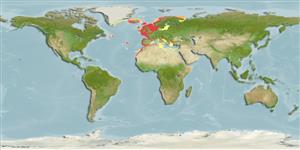Environment: milieu / climate zone / depth range / distribution range
Ecologie
marien; brak water demersaal; diepte 10 - 340 m (Ref. 56504), usually 10 - 150 m (Ref. 35388). Temperate; 71°N - 21°N, 49°W - 42°E
Eastern Atlantic: Norway to Morocco, Madeira, Iceland (Ref. 2723), including Greenland (Ref. 115160). Also known from the Mediterranean and Black Sea (Ref. 4697).
Lengte bij maturiteit / Grootte / Gewicht / Leeftijd
Maturity: Lm 18.8, range 24 - ? cm
Max length : 60.0 cm TL mannelijk / geslacht onbekend; (Ref. 3397); common length : 30.0 cm TL mannelijk / geslacht onbekend; (Ref. 4697); max. gepubliceerd gewicht: 956.00 g (Ref. 41256)
Head large without deep occipital groove. Vertebrae 37-39 (11-13 precaudal and 25-27 caudal).
Common on sandy grounds, sometimes on rocky bottoms, and also on mud between coastline to 140 m depth. Up to depth of 340 m in the eastern Ionian Sea (Ref. 56504). Feeds on crustaceans, mostly shrimps and shore crabs; fishes, mostly gobies, flatfish, young herring and sand eels. Makes croaking sounds (Ref. 9987). Utilized fresh and frozen; eaten fried and baked (Ref. 9987).
The young are pelagic until attaining a length of 3 cm.
Bauchot, M.-L., 1987. Poissons osseux. p. 891-1421. In W. Fischer, M.L. Bauchot and M. Schneider (eds.) Fiches FAO d'identification pour les besoins de la pêche. (rev. 1). Méditerranée et mer Noire. Zone de pêche 37. Vol. II. Commission des Communautés Européennes and FAO, Rome. (Ref. 3397)
Status op de Rode Lijst van het IUCN (Ref. 130435)
Gevaar voor de mens
Harmless
Gebruik door de mens
Visserij: commercieel
Meer informatie
ReferentiesAquacultuurAquacultuurprofielKweeklijnenGeneticaElectrophoresesErfelijkheidZiektesVerwerkingNutrientsMassaconversie
Tools
Speciale rapporten
Download XML
Internetbronnen
Estimates based on models
Preferred temperature (Ref.
123201): 7.3 - 13.5, mean 10.1 °C (based on 1378 cells).
Fylogenetische diversiteitsindex (Ref.
82804): PD
50 = 1.0000 [Uniqueness, from 0.5 = low to 2.0 = high].
Bayesian length-weight: a=0.00692 (0.00574 - 0.00834), b=3.04 (2.98 - 3.10), in cm total length, based on LWR estimates for this species (Ref.
93245).
Trofisch niveau (Ref.
69278): 3.9 ±0.0 se; based on diet studies.
Generation time: 6.9 ( na - na) years. Estimated as median ln(3)/K based on 1
growth studies.
Weerstandsvermogen (Ref.
120179): Gemiddeld, minimale populatieverdubbelingstijd 1,4-4,4 jaar (K=0.16; tm=3-4; tmax=16; Fec=200,000).
Prior r = 0.74, 95% CL = 0.49 - 1.10, Based on 1 stock assessment.
Fishing Vulnerability (Ref.
59153): High vulnerability (55 of 100).
Climate Vulnerability (Ref.
125649): Low to moderate vulnerability (27 of 100).
Nutrients (Ref.
124155): Calcium = 42.8 [23.8, 88.7] mg/100g; Iron = 0.431 [0.232, 0.773] mg/100g; Protein = 17.6 [15.9, 19.4] %; Omega3 = 0.682 [0.312, 1.889] g/100g; Selenium = 21.1 [10.6, 47.8] μg/100g; VitaminA = 12.8 [4.8, 37.7] μg/100g; Zinc = 0.494 [0.355, 0.707] mg/100g (wet weight);
